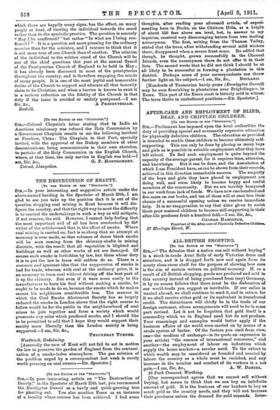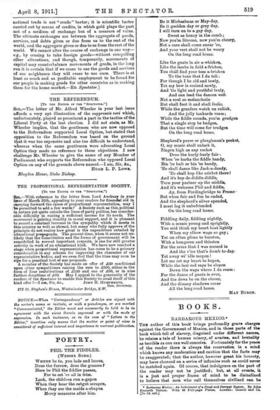ALL-BRITISH SHOPPING.
[To THE EDITOR ON THE "SPECTATOR."' SIR,—" The delusion that a nation can sell without buying" is a stock-in-trade Aunt Sally of early Victorian dress and structure, and it is dragged forth now and again from its musty class-room shelf for the purpose of showing how sure is the aim of certain writers on political economy. If, as a result of all-British shopping, goods are produced and sold in this country instead of being purchased from (say) Germany, it by no means follows that there must be the dislocation of our world-trade you suggest as inevitable. If our calico is wanted abroad, we shall continue to send it, and in return for it we shall receive either gold or its equivalent in transferred credit. The disturbance will chiefly be in the trade of our foreign customer, whose arrangements will need to be in some part revised. Let it not be forgotten that gold itself is a commodity which we in England need but do not produce. Your reasonings and examples would better apply if the business affairs of the world were carried on by means of a crude system of barter. Of the factors you omit from view, one—the medium of exchange—is (to quote an expression in your article) "the essence of international commerce," and another—the employment of labour on industries which supply the home market—a secular need. To the extent to which wealth may be considered as founded and created by labour the country as a, whole must be enriched, and any increase in the number and comfort of its workers is a net gain.—I am, Sir, &c., A. W. DANIEL. 10 Park Crescent, Worthing.
[Our correspondent agrees that we cannot sell without buying, but seems to think that we can buy an indefinite amount of gold. It is the business of our bankers to buy as much gold as the country needs, and they will not increase their purchases unless the demand for eold expands. Inter. national trade is not "crude" barter; it is scientific barter carried out by means of credits, in which gold plays the part not of a medium of exchange but of a measure of value. The ultimate exchanges are between the aggregate of goods, services, and debts given or due from us to the rest of the world, and the aggregate given or due to us from the rest of the world. We cannot alter the course of exchange in one way- e.g., by ceasing to take foreign goods—without compelling other alterations, and though, temporarily, movements of capital may counterbalance movements of goods, in the long run it is certain that if we cease to use the goods and services of our neighbours they will cease to use ours. There is at least as much and as profitable employment to be found for our people in making goods for other countries as in making them for the home market.—En. Spectator.]











































 Previous page
Previous page